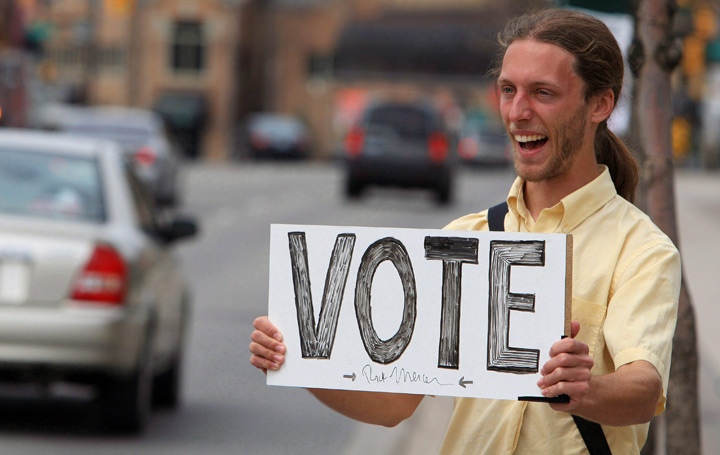The youngest generation of voters doesn’t trust politicians and doesn’t believe political parties address their concerns, according to a new Broadbent Institute report on millennial attitudes toward politics.

The report, based on an online survey and online interviews with people between the ages of 15 and 34, found that 70 per cent of young people feel ignored by politicians.
“The big storyline here is a deep disaffection and distrust in politicians and political institutions,” said Jonathan Sas, director of research with the Broadbent Institute and a millennial himself.
But that’s not to say young people don’t care.
“It’s very clear millennials are concerned and engaged and even politicized on many issues but they don’t feel their voices are being heard. We don’t feel as if our priorities are being reflected in the policies and political discourse of the current day and that helps explain the disaffection.”
That disaffection leads to lower voting turnout: About 42 per cent of people aged 18-34 voted in the 2011 federal election, according to Election Canada estimates. By contrast, 73 per cent of people aged 55-74 voted.
It’s no surprise political parties focus their efforts on older people – further disengaging millennials.
“It’s a self-reinforcing cycle here where lower voter turnout means not as much political capital is spent on engaging youth because parties don’t expect the return. And, in turn, by not voting, millennials have less of a chance to have their voice heard,” Sas said.
Young people do care

Get breaking National news
Despite their low turnout, young people are still civic-minded, according to the report. Their top-ranked issues are not too different from most people’s: healthcare, education and job creation take the top spots. Most millennials also prioritize equality of opportunity, the wellbeing of old people and ensuring a good future for young people.
“These are not youth issues, these are people issues,” said Jane Hilderman, executive director of Samara, a charitable organization that conducts research and activities to reconnect citizens to politics.
Cynicism towards traditional politics means millennials seek change things through other means, such as starting non-profits or small businesses.
But like it or not, politics still affects them, Hilderman said.
“To give up that lever to have influence is a challenge and I think also overall weakens our democracy. If large swathes of our democracy, particularly young people, are stepping out and standing on the sideline of that system, we have a problem.”
And while people do tend to vote more as they get older and more settled, she said, she’s worried by the unusually low turnout among first-time voters – only 40.5 per cent last federal election. In the 1970s, over 80 per cent of 18 to 24-year-olds voted.
Research shows that voting is a habit, she said. “So if you miss your first or second opportunity to vote in an election, the odds that you are going to start voting later in life drop a lot.” This could cause turnout to drop even more overall as current millennials age.
Breaking the disengagement cycle
“There needs to be a shift in our understanding of the good that there is in public service and in government and the positive role that government can play in shaping the kind of society that millennials tell us they want,” Sas said.
“We need to connect the dots as millennials between our aspirations and the change we want to see.”
Caro Loutfi, executive director of Apathy is Boring, a youth-led organization that works to increase young people’s participation in politics, notes many young people in the report said that they don’t know enough about politics, and that’s why they don’t vote. Her organization hears the same thing, she said.
“When we talk to young people about information that they’re lacking, a lot of it is actually quite basic in terms of understanding the way that the political process works, understanding in the case of an election specifically, how to register to vote, how to change your address, how to gather more information about political parties and candidates in somewhat of a neutral way,” she said.
“A lot of information that’s out there is maybe not as accessible as a lot of information that young people are digesting these days.”
To help fix that, her group is working with Elections Canada to develop new information products that are easier to understand. Apathy is Boring also conducts workshops which point out how politics affect people’s daily lives and encourage them to get in touch with their elected representatives on issues that are important to them.
“One avenue towards that is by engaging in the political process. No question,” Sas said. “But on the other hand, it is incumbent upon politicians of all parties to put front and centre and spend political capital by talking to the issues that millennials are concerned about. It’s a two-way street.”






Comments
Want to discuss? Please read our Commenting Policy first.